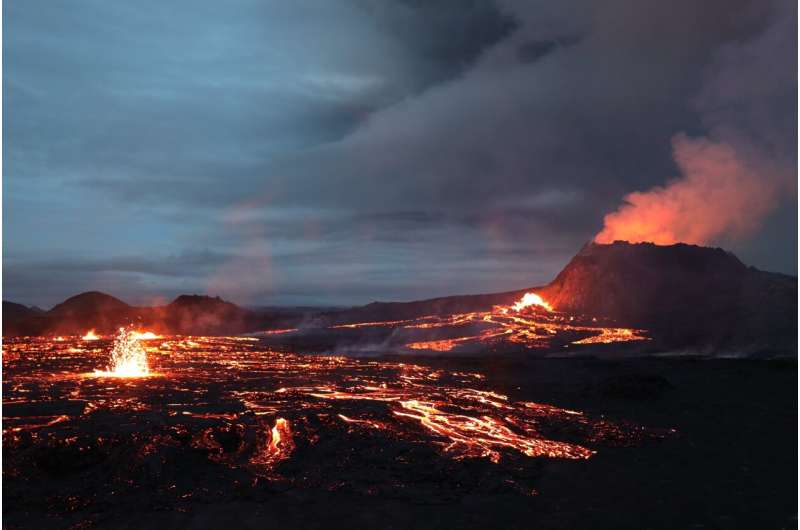This article has been reviewed according to Science X's editorial process and policies. Editors have highlighted the following attributes while ensuring the content's credibility:
fact-checked
trusted source
proofread
Q&A: Is a volcano about to erupt in Iceland? Expert explains the telltale signs that an eruption might occur

Residents of Grindavik, a fishing town in southwestern Iceland, have evacuated and a state of emergency has been declared, as local authorities say a volcanic eruption may be imminent.
The region has been seismically volatile for a while, as hundreds of small earthquakes have been recorded in the past two weeks and a 5.1 magnitude earthquake struck on Friday.
Moreover, Iceland's Meteorological Office said Saturday that a 6.2-mile corridor of magma, or semi-molten rock, extends under the community and is spreading. Magma is called lava when it is on the surface.
But how do you tell when a volcano is about to erupt? And what are the major risks from an eruption?
Northeastern Global News spoke with Daniel Douglass, teaching professor in marine and environmental sciences at Northeastern's Marine Science Center, about what is happening in Iceland geologically, the risks from a volcanic eruption, and more.
The conversation has been lightly edited for brevity and clarity.
What is going on in Iceland right now that suggests we're in line for a volcanic eruption?
So there's usually three different precursors that let people know something is happening deep inside the earth, which we most commonly notice as magma moves closer to the surface.
- The ground surface starts to swell where it is pushed up by magma underneath the surface.
- Rocks begin cracking, which is manifest as earthquakes.
- And a change or increase in volcanic gases occurs, as these can escape when the magma moves closer to the surface.
The more of any of those things you see, the more likely something is coming to the surface.
Two of the three things are happening in Iceland: they were recording the ground lifting up by 2½ inches in the vicinity of where the eruption might take place (although the ground may have subsided recently). Earthquakes are continuing apace.
They are clearly seeing a strong indication that something is happening underground and something indicative of magma rising and spreading out vertically.
So based on these signals, do we know when an eruption could occur?
It is impossible to give an exact moment when lava comes out, but they are now on high alert and will continue to be so until the ground surface stops changing, the earthquakes stop, etc. And sometimes things move closer to an eruption and just stop. But Iceland officials seem to be pretty convinced that an eruption will occur, and they have the local knowledge, so I'm going with that.
Is there a specific volcano that geologists are monitoring?
What is most likely to occur is not likely a volcano cone with smoke coming out the top. Rather you'll get a fissure with lava coming out along pretty much the entire length of the crack.
The broader context is that Iceland is in the process of getting pulled apart in two pieces. Half of it is on the North American tectonic plate; half is on the European tectonic plate, and they are moving apart.
So, a volcano erupts in Iceland every couple of years, so as a culture they are used to this; but the eruption is generally not underneath a small town.
What is the danger posed by this volcanic eruption?
The fissure is very close to the town of Grindavik, which has a few thousand people. The people and pets are evacuated, but buildings don't move. So, in terms of potential harm, it depends on where the crack forms and how much lava comes out. Once it comes out of the crack it will flow downhill until it cools and hardens, and it will just cover the landscape in a new layer of lava over what is already there.
Also, the type of magma produced under Iceland is almost always this thin, runny magma that is maybe the consistency of maple syrup. But thinner lava will flow faster and flow farther.
There is also a potential scenario where the crack extends into the ocean. If lava (which will be 2,000°F) comes out of the sea floor, then the ocean water boils and turns to steam and the eruption becomes much more explosive. At that point it will start sending fine particles (ash) relatively high into the atmosphere, potentially impacting jet travel. This occurred in 2010, canceling more than 100,000 flights and costing airlines $3 billion.
Provided by Northeastern University




















